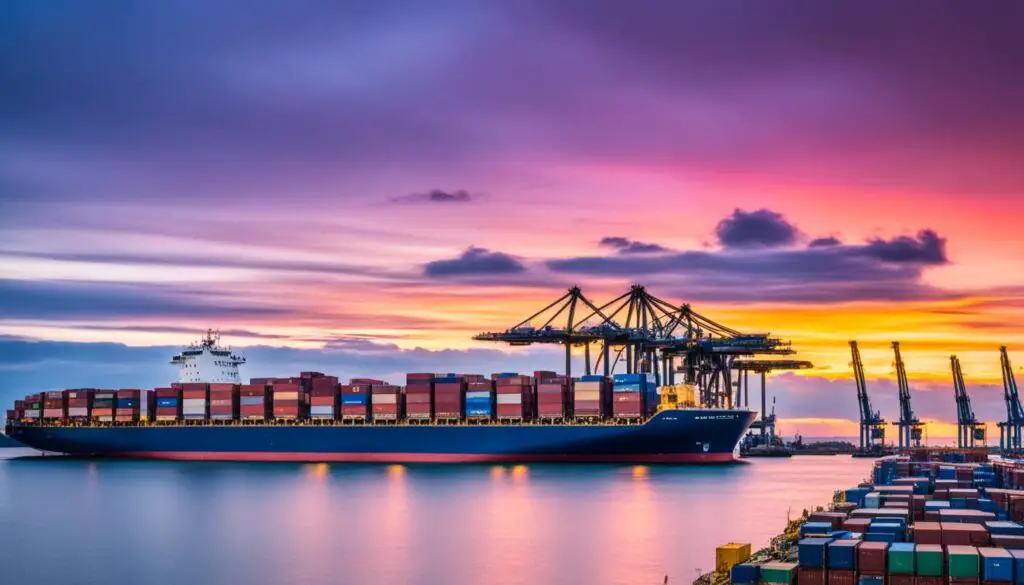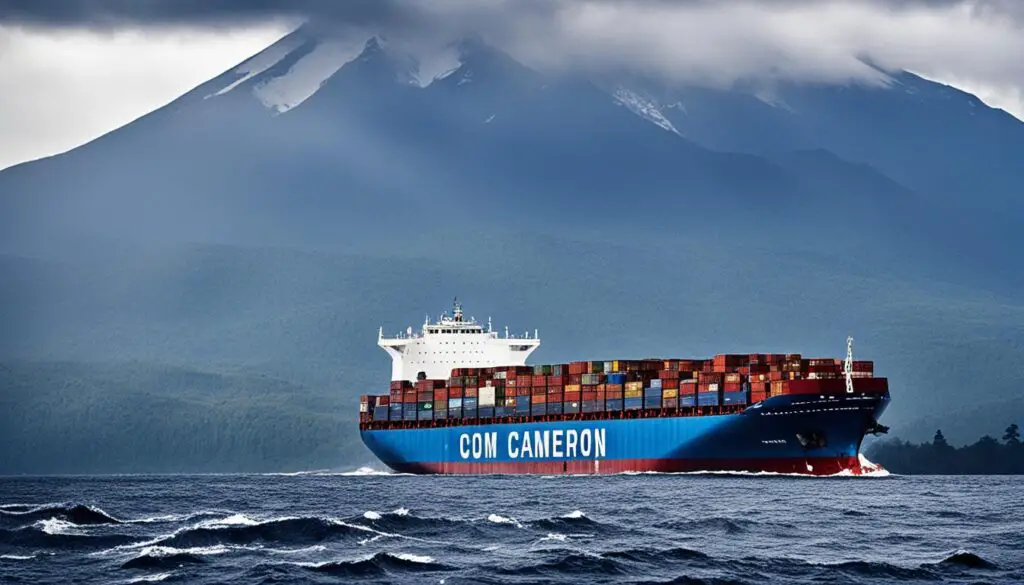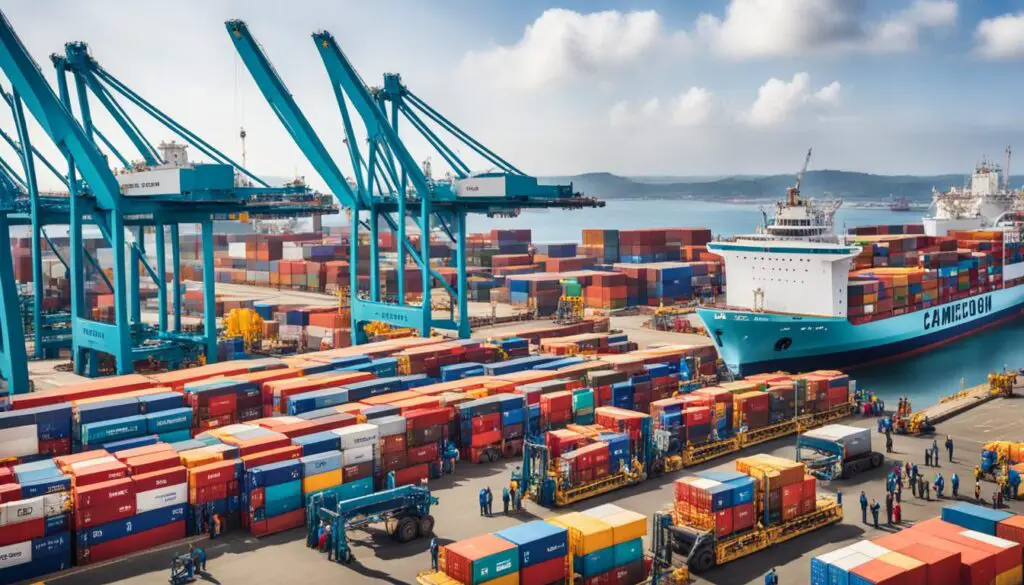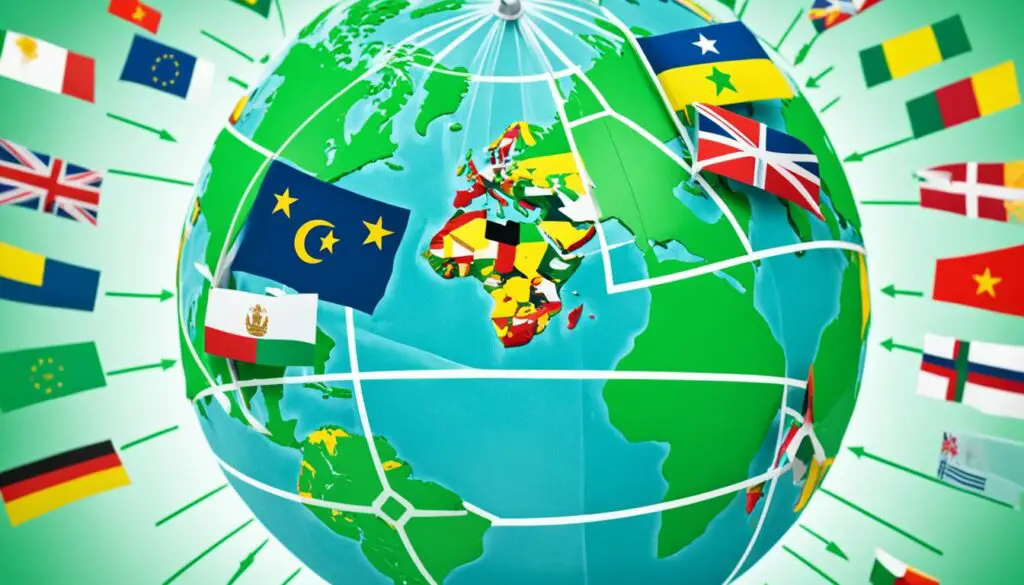Welcome to our comprehensive guide on the fascinating world of Cameroon exports and their significance in global trade connections. Cameroon, located in Central Africa, boasts a diverse array of export products that contribute to its growing presence in international markets. Understanding the country’s export sector is crucial for businesses and individuals interested in global trade dynamics.
Key Takeaways:
- Cameroon exports play a vital role in global trade networks, fostering economic growth and international cooperation.
- The country’s key export sectors encompass various industries such as agriculture, mining, petroleum, and manufacturing.
- Cameroon’s top export products include crude oil, cocoa, coffee, timber, and bananas, highlighting the diversity of its export portfolio.
- Significant trade partnerships exist between Cameroon and countries/regions such as China, France, Nigeria, and the European Union.
- Challenges in Cameroon’s export trade range from trade barriers and infrastructure limitations to the need for market diversification and enhanced competitiveness.
Now, let’s delve deeper into the fascinating world of Cameroon exports and uncover the key insights that shape its global trade connections.
Understanding Cameroon’s Export Sector
Cameroon’s export sector plays a pivotal role in driving the country’s economic growth and establishing its presence in the global market. With a diverse range of key industries contributing to its export value, Cameroon has emerged as a significant player in international trade.
One of the key industries driving Cameroon’s export sector is agriculture. The country is known for its production and export of commodities such as cocoa, coffee, bananas, and palm oil. These agricultural products not only contribute to Cameroon’s export value but also play a vital role in supporting the livelihoods of many local farmers.
Another prominent industry within Cameroon’s export sector is the extractive sector, specifically oil and gas. The discovery and extraction of oil reserves have significantly boosted Cameroon’s export value and revenue, allowing the country to strengthen its economic position in the global market.

In addition to agriculture and the extractive sector, Cameroon’s export sector also encompasses other industries such as timber and forestry products, manufacturing goods, and textiles. These industries contribute to the country’s export value and provide employment opportunities for its citizens.
Cameroon’s export sector plays a crucial role in sustaining economic development and fostering international trade relationships. The country’s commitment to expanding and diversifying its export portfolio is evident in its efforts to promote and support key industries.
In the next section, we will explore the top export products that emerge from Cameroon and delve into the diverse range of goods that contribute to its global presence.
Top Export Products from Cameroon
Cameroon boasts a diverse range of top export products that contribute to its global presence and economic growth. These products not only showcase the country’s rich natural resources but also highlight its position as a key player in international trade.
One of Cameroon’s top export products is petroleum. With abundant oil reserves, the country has established itself as a major supplier of petroleum products. The oil industry plays a significant role in driving Cameroon’s economy and strengthening its trade connections with other nations. The export of petroleum accounts for a substantial portion of the country’s overall export value.
Another noteworthy export product from Cameroon is cocoa. Known for its high-quality cocoa beans, the country has become a leading producer and exporter of this precious commodity. Cameroon’s cocoa beans are highly sought after by chocolate manufacturers worldwide, due to their exceptional flavor and aroma. The export of cocoa provides significant revenue for the country and supports the livelihoods of many local farmers.
Furthermore, Cameroon is renowned for its timber exports. The country’s vast forests are home to a variety of valuable timber species, making it a prominent player in the international timber market. Cameroon’s timber exports contribute to the global supply chain and cater to various industries, including construction and furniture manufacturing.
In addition to petroleum, cocoa, and timber, Cameroon also exports significant quantities of coffee, bananas, aluminum, cotton, and palm oil, among other products. This product diversity highlights the country’s ability to meet the demands of various international markets and underscores its strength as a trusted trading partner.
Product diversity driving Cameroon’s global export market
The diverse range of export products from Cameroon allows the country to maintain a strong presence in the global export market. By offering an array of valuable commodities, Cameroon can adapt to changing market dynamics and respond to the needs of different countries and industries.
Furthermore, this product diversity helps mitigate risks associated with overdependence on a single export product. By spreading its export portfolio across various sectors, Cameroon can better protect its economy from potential market fluctuations and shifts in global demand.
Cameroon’s Export Partnerships
Cameroon has established strong trade partnerships with various countries and regions, making it a significant player in the global export market. These partnerships have positioned Cameroon as a key exporter, contributing to its economic growth and development.
One of Cameroon’s prominent trade partners is Nigeria, its neighboring country. Trade between Cameroon and Nigeria has flourished over the years due to their geographic proximity and shared economic interests. Nigeria serves as a significant export destination for various Cameroonian products, such as agricultural commodities, petroleum products, and manufactured goods.
In addition to Nigeria, China plays a crucial role in Cameroon’s export landscape. The partnership between the two countries has expanded Cameroon’s export reach to one of the largest consumer markets in the world. Cameroon exports goods such as crude oil, timber, and agricultural products to meet the demands of the Chinese market.
Furthermore, Canada has emerged as a key trade partner for Cameroon. The bilateral trade relationship between these two nations has been strengthened by collaborations in sectors such as mining, energy, agriculture, and forestry. Cameroon exports commodities like wood products, minerals, and oil to Canada, contributing to the bilateral trade flow.
Another noteworthy trade partner for Cameroon is the European Union (EU). The EU is a significant destination for Cameroonian exports, particularly in sectors such as cocoa, coffee, and tropical fruits. The EU-Cameroon trade partnership is further enhanced by the Economic Partnership Agreement (EPA) between the two, promoting trade, investment, and development cooperation.
Other countries and regions that maintain substantial trade partnerships with Cameroon include France, Belgium, India, and Saudi Arabia, among others. These partnerships open doors to diverse export destinations and create opportunities for economic growth in Cameroon.

With these trade partnerships in place, Cameroon continues to strengthen its position in the global export market, showcasing the country’s potential for trade diversification and economic prosperity.
Challenges in Cameroon’s Export Trade
Exporting goods from Cameroon comes with its share of challenges, including trade barriers and infrastructure limitations. These obstacles hinder the smooth flow of trade and pose difficulties for the country’s export sector.

Trade barriers are one of the primary challenges faced by Cameroon’s exporters. These barriers can take various forms, including tariffs, quotas, and non-tariff barriers such as sanitary and phytosanitary measures. They can significantly impede trade by increasing costs and restricting market access.
Infrastructure limitations also pose significant challenges to Cameroon’s export trade. Inadequate transportation systems, including roads, railways, and ports, can hinder the efficient movement of goods and increase logistics costs. Limited access to reliable and efficient infrastructure can limit the country’s export capacity and competitiveness in the global market.
Addressing these challenges requires a coordinated effort from both the public and private sectors. Investments in infrastructure development, including transportation and logistics, can help improve trade efficiency and reduce export costs. Additionally, the government can work towards reducing trade barriers through bilateral and multilateral negotiations and the implementation of trade facilitation measures.
Overcoming these obstacles is crucial for Cameroon’s export sector to thrive and capitalize on its potential as a global trading partner. By addressing trade barriers and enhancing infrastructure, Cameroon can unlock new opportunities for its exporters, promote economic growth, and strengthen its position in the global trade arena.
Initiatives to Boost Cameroon’s Export Competitiveness
Cameroon recognizes the importance of bolstering its export competitiveness in the global market. To achieve this goal, the Cameroonian government, in collaboration with various entities, has implemented several initiatives aimed at enhancing the country’s export capabilities and expanding its reach in international trade.
One of the key initiatives is the establishment of export competitiveness programs that provide support and guidance to local businesses. These programs offer resources and expertise to help companies improve product quality, streamline production processes, and comply with international trade standards. By equipping businesses with the necessary tools and knowledge, the government aims to enhance their competitiveness and enable them to meet the demands of the global market.
In addition to government support, Cameroon has actively engaged in public-private partnerships to drive export growth. These partnerships facilitate collaboration between the government, industry associations, and private enterprises to identify and address challenges, promote innovation, and create favorable business environments. By leveraging the expertise and resources of both public and private sectors, Cameroon aims to achieve sustainable export growth and establish itself as a competitive player in the global trade arena.
Investing in Trade Infrastructure
Recognizing the critical role of infrastructure in facilitating export trade, the Cameroonian government has embarked on significant investments in transportation, logistics, and trade-related infrastructure. These investments aim to improve connectivity, reduce trade barriers, and enhance efficiency in export processes. From modernizing ports and airports to upgrading road and rail networks, these infrastructure projects are designed to create an enabling environment for businesses to seamlessly transport their products to international markets.

Trade Promotion and Market Diversification
Cameroon places great emphasis on promoting its export sectors and diversifying its market presence. Through trade promotion initiatives, such as participation in international trade fairs and exhibitions, the government aims to showcase the country’s export potential and attract foreign buyers. By actively engaging with international buyers and exploring new markets, Cameroon seeks to expand its export customer base, reduce dependency on a few markets, and mitigate risks associated with economic fluctuations.
Moreover, the government provides targeted support to exporters, including access to market intelligence, trade financing, and export-oriented training programs. These initiatives empower exporters by equipping them with knowledge and resources to penetrate new markets, overcome barriers, and capitalize on emerging opportunities.
The government’s commitment to supporting export competitiveness initiatives is evident in its regulatory reforms and policy frameworks. Through these measures, Cameroon aims to create an enabling business environment that encourages entrepreneurship, facilitates trade, and fosters innovation.
By implementing these initiatives and fostering collaboration among various stakeholders, Cameroon is paving the way for enhanced export competitiveness and positioning itself as an attractive trade partner on the global stage.
Cameroon’s Participation in International Trade Agreements
Cameroon’s trade policies and global trade relationships are shaped significantly by its participation in international trade agreements. These agreements play a crucial role in facilitating trade between Cameroon and partner countries, promoting economic growth and enhancing cooperation in various sectors.
By actively participating in international trade agreements, Cameroon aims to foster a favorable trade environment that promotes fair practices, reduces trade barriers, and encourages economic integration among nations. These agreements provide a framework for establishing mutually beneficial trade policies, rules, and regulations that govern the exchange of goods and services.
One prominent example of Cameroon’s involvement in international trade agreements is its membership in the Economic Community of Central African States (ECCAS). As a member of ECCAS, Cameroon benefits from preferential trade arrangements with other member countries, fostering regional economic cooperation and integration.
Moreover, Cameroon is also a member of the Central African Economic and Monetary Community (CEMAC), which aims to promote economic growth, stability, and monetary cooperation among its member states. Through its participation in CEMAC, Cameroon benefits from harmonized trade policies and a common market that facilitates the free movement of goods, services, and capital within the region.
Furthermore, Cameroon is a signatory to the African Continental Free Trade Area (AfCFTA) agreement. AfCFTA is a landmark trade agreement that aims to create a single market for goods and services in Africa, promoting intra-African trade and boosting economic integration across the continent. By joining AfCFTA, Cameroon demonstrates its commitment to further expanding its trade relationships within Africa.
The Importance of International Trade Agreements for Cameroon
Participation in international trade agreements allows Cameroon to leverage its competitive advantages, such as its rich natural resources and diverse export sector. These agreements provide the necessary frameworks and platforms for Cameroon to negotiate favorable trade terms, access new markets, attract foreign investments, and enhance the competitiveness of its export industries.
Additionally, international trade agreements enable Cameroon to address trade-related challenges and barriers, such as tariffs, non-tariff barriers, and intellectual property rights. By establishing clear rules and dispute settlement mechanisms, these agreements contribute to a more transparent and predictable trade environment, fostering trust and confidence among trading partners.
Through its active involvement in international trade agreements, Cameroon seeks to bolster its trade policies, expand its export market reach, and improve its overall trade performance. By embracing international cooperation and integration, Cameroon aims to create a conducive environment for sustainable economic development and prosperity.

Potential for Future Growth in Cameroon’s Exports
In today’s global economy, Cameroon has positioned itself as a significant player in the export sector. With its diverse range of export products and strong trade partnerships, the country has established a solid foundation for future growth and expansion.
One of the key factors driving Cameroon’s potential for future growth in exports is the promising outlook for emerging export markets. As new markets continue to open up and demand for goods and services increases, Cameroon has the opportunity to tap into these markets and diversify its export portfolio.
Emerging Export Markets
Cameroon’s export sector has the potential to benefit from emerging markets across the globe. The rising middle class in countries such as China, India, and Brazil presents a significant opportunity for Cameroon to expand its export reach and cater to the growing demands of these consumer markets.
In addition to traditional markets, Cameroon has also been exploring new export avenues in sectors such as renewable energy, technology, and digital services. By harnessing the potential of these emerging sectors, Cameroon can tap into the demand for innovative and sustainable solutions, further fueling its export growth.
Diversification
Diversifying its export portfolio is crucial for Cameroon’s long-term growth prospects. By reducing its dependency on a single product or market, the country can minimize the risks associated with market fluctuations and global economic uncertainties.
Cameroon has recognized the importance of diversification and is actively encouraging businesses to explore new export opportunities. The government has implemented various initiatives to support and promote diversification, including providing financial incentives, fostering innovation, and strengthening trade relationships with potential export partners.
As Cameroon expands its export horizons and explores new frontiers, the future growth prospects for its exports are promising. By capitalizing on emerging export markets and embracing diversification, Cameroon can continue to strengthen its position in the global trade landscape and achieve sustainable economic prosperity.
The Impact of Cameroon’s Exports on Global Trade
Cameroon’s exports play a pivotal role in shaping global trade and have significant economic significance. The country’s ability to export goods and services to international markets has profound implications on both domestic and foreign economies, influencing various sectors and industries worldwide.
With a diverse range of export products and a growing global presence, Cameroon has emerged as a key player in the global trade landscape. Its exports contribute to the supply chains of numerous countries, fostering economic interdependence and driving growth.
The impact of Cameroon’s exports stretches beyond mere trade transactions. It influences the competitiveness of industries, the allocation of resources, and the overall economic well-being of nations. The revenue generated from exports enables the country to invest in infrastructure, education, and healthcare, fostering socio-economic development.
Driving Economic Growth
The export sector in Cameroon serves as a catalyst for economic growth and serves as a source of foreign exchange earnings. By participating in global trade, Cameroon can attract foreign investment, develop new markets, and stimulate entrepreneurship. The revenue generated from exports contributes to the country’s Gross Domestic Product (GDP) and supports job creation, poverty reduction, and improved standards of living for its citizens.
Enhancing Trade Relationships
Cameroon’s exports foster trade relationships with its export partners, strengthening diplomatic ties and promoting international cooperation. These partnerships enable mutual benefits, allowing countries to leverage their respective strengths and create synergies through trade. Furthermore, Cameroon’s participation in international trade agreements facilitates market access, reduces trade barriers, and promotes a rules-based global trading system.
Spurring Innovation and Competitiveness
The act of exporting encourages innovation and competitiveness within domestic industries. To succeed in the global market, businesses must continually strive to improve product quality, develop new technologies, and enhance operational efficiency. This drive for innovation ultimately benefits consumers, as they gain access to a wider range of high-quality goods and services at competitive prices.
In conclusion, the impact of Cameroon’s exports on global trade extends far beyond economic figures and transactional value. It represents the country’s integration into the global economy, driving growth, fostering international relations, and contributing to the overall well-being of its citizens. As Cameroon continues to expand its export portfolio and explore emerging markets, its influence on global trade will only grow stronger, shaping the future of international commerce.
Conclusion
In conclusion, our exploration of Cameroon’s exports has shed light on the country’s significant role in shaping global trade connections. Through a detailed analysis of Cameroon’s export sector, we have uncovered the key industries that drive its export economy and identified the top products that contribute to its global presence.
Furthermore, we have examined the trade partnerships and destinations that play a vital role in Cameroon’s export growth, as well as the challenges and obstacles that the country faces in international trade.
Fortunately, the Cameroonian government and other entities have taken proactive initiatives to boost export competitiveness and enhance trade relationships. Additionally, Cameroon’s participation in international trade agreements serves as a catalyst for further growth and economic development.
Looking towards the future, Cameroon shows great potential for continued growth in its exports. By exploring emerging markets and diversifying its export portfolio, Cameroon can further expand its global trade connections and capitalize on new opportunities.
Overall, Cameroon’s exports have a substantial impact on global trade, contributing to economic growth and influencing international markets. As the country continues to develop and innovate, its exports will play an increasingly crucial role in shaping the global trade landscape.
FAQ
What are Cameroon exports and why are they significant in global trade connections?
Cameroon exports refer to the goods and products that are produced domestically in Cameroon and sold to other countries. These exports play a crucial role in establishing trade connections and fostering economic relationships between Cameroon and the rest of the world.
Which industries contribute to Cameroon’s export sector, and what is the value of its exports?
Cameroon’s export sector is driven by key industries such as oil and gas, agricultural products (such as cocoa and coffee), timber, and mining. The value of Cameroon’s exports is significant, contributing to the country’s economic growth and development.
What are some of the top export products that come from Cameroon, and how diverse is its product range?
Cameroon’s top export products include oil, wood products, cocoa, coffee, and aluminum. However, the country also boasts a diverse range of exports, including bananas, rubber, cotton, and fishery products, showcasing the versatility of its export industry.
Which countries and regions are Cameroon’s trade partners and major destinations for its exports?
Cameroon maintains strong trade partnerships with various countries and regions, including China, the European Union, the United States, Central African countries, and neighboring West African countries. These regions serve as significant export destinations for various Cameroonian goods.
What are the challenges faced by Cameroon’s export trade, including any trade barriers and infrastructure limitations?
Cameroon’s export trade encounters challenges such as trade barriers, including tariffs and non-tariff barriers imposed by other countries. Infrastructure limitations, such as inadequate transportation systems and logistical constraints, also pose obstacles to the smooth movement of goods for export.
What initiatives has the Cameroonian government undertaken to enhance export competitiveness?
The Cameroonian government, along with other entities, has implemented various initiatives to boost the country’s export competitiveness. These initiatives include improving infrastructure, providing financial support to exporters, promoting value addition in key industries, and streamlining trade processes.
How is Cameroon involved in international trade agreements, and how do these agreements shape its trade policies?
Cameroon actively participates in international trade agreements such as the African Continental Free Trade Area (AfCFTA) and the Economic Partnership Agreement (EPA) with the European Union. These agreements shape Cameroon’s trade policies, encouraging market diversification, and facilitating smoother trade relationships with partner countries.
What is the potential for future growth in Cameroon’s exports, including emerging export markets and the need for diversification?
Cameroon’s exports have significant potential for future growth. The country can explore emerging export markets in sectors such as renewable energy, technology, and manufacturing. Diversification of its export portfolio is also crucial to mitigate risks and maximize opportunities in changing global markets.
What is the impact of Cameroon’s exports on global trade, and what is their economic significance?
Cameroon’s exports contribute to the global trade landscape by providing essential commodities and raw materials. They also play a vital role in the country’s economy by generating revenue, creating jobs, and supporting sustainable economic development, both domestically and internationally.